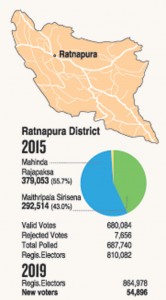News
Parties frantically count heads in tight contest
KANDY DISTRICT :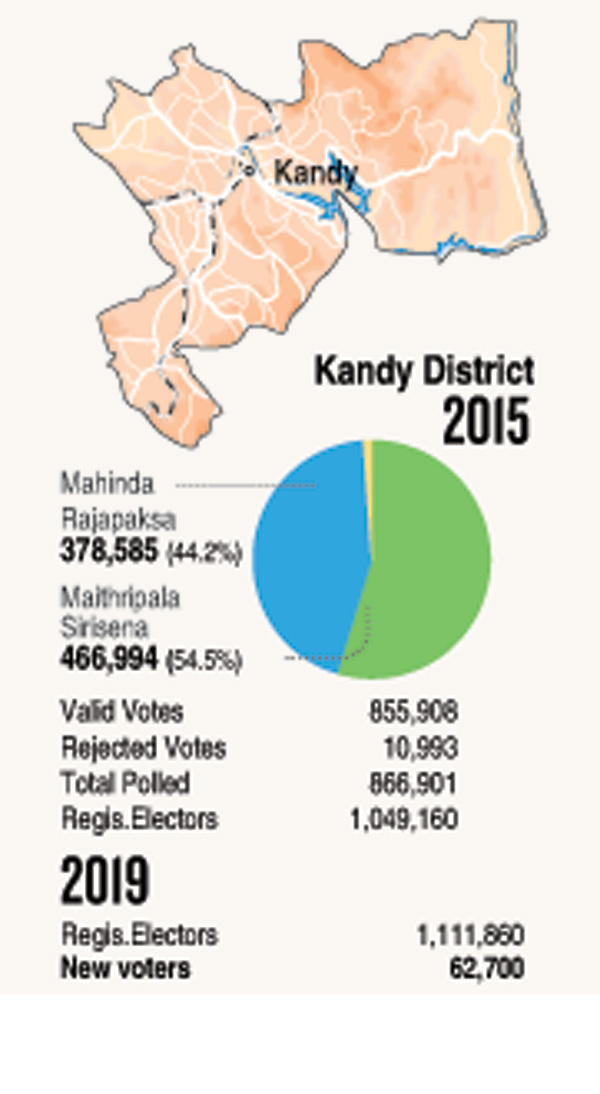
Kandy tipped to stay UNP but other major prizes could go any way
With more than 1.1 million votes up for grabs in the district, Kandy is one of the biggest prizes on offer at next Saturday’s presidential election.
Kandy’s importance to the overall presidential race was underscored this week when all three main candidates, Sajith Premadasa, Gotabaya Rajapaksa and Anura Kumara Dissanayake, campaigned in the district on the same day on Tuesday.
Campaign meetings are causing immense traffic congestion in compact Kandy town despite the best efforts of police.
Authorities have drafted a special plan for the district to ensure that bad weather will not disrupt voting and ballot counting on election day.
Although candidates are busy on the campaign trail, there are few visible signs that a presidential poll is in full swing – a pattern also showing up in other districts in this election. Posters, cutouts and banners are scarce and most are only found near the venues of political rallies. Voters, however, are intent on exercising their franchise.
“Change” seems to be the overriding factor in the minds of voters, with most expressing the hope that whoever becomes president will effect reforms that will aid them and their children.
The high cost of living, lack of employment opportunities, education and national security are among the chief concerns.
Asoka Karunatilleke, 47, makes his living mainly by selling betel and narang juice on the roadside. It was a struggle to earn even Rs. 500 a day, he said. “I have two children aged 16 and four. The eldest is sitting for his O/Levels and I can’t afford to send him to tuition classes. We hope the new president will provide relief for poor people like us.”
Lionel Jayatissa, 67, said retirees such as himself were finding life difficult. “I have two daughters, one of whom is in the state service. I am doing relatively well but many others are facing hardship. The cost of living makes life especially hard. I hope we can elect a leader who can eradicate corruption and make the cost of living easier to bear,” Mr. Jayatissa said.
C. Sujani, 52, said she started up a fruit stall about a year ago to fund the education of her two children. “My son is 23 and still studying. He wants to get into bio-science. We are not going to ask him to stop studying and find a job since it is our duty as parents to support their education.
“My husband is a former soldier but his pension is not enough to support the education of my son and daughter so that’s why I started this shop,” she explained.
While saying she would vote as it was her civic duty, Ms Sujani said there was no point in waiting for relief from politicians. “We have to stand on our own. We will vote for the betterment of the country and for our children, but it’s unreasonable to expect things such as jobs,” this mother said.
Friends Mohammed Muneez, A.C.M. Rasan and M.Y.M. Sarjun, all in their twenties, work in different fields – one as a three-wheeler driver, one as a labourer and the other as an electrician. All three intend to vote at the election, saying reconciliation is a major issue.
As Muslims, the young men said they were concerned about racist attacks directed against the Muslim community. “We all want to live in peace and security. We want to be kept safe,” Rasan said.
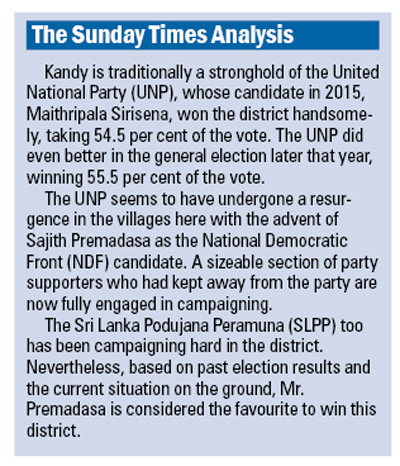
| Trials and tribulations of voting, not to mention the weather | |
Authorities in the Kandy district have drawn up a special plan to ensure that inclement weather does not disrupt voting and the counting process on election day, Kandy District Secretary (DS) Tissa Karunaratne told the Sunday Times. 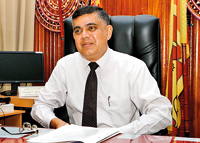 Tiss Karunarathne “The Nawalapitiya and Akurana towns tend to flood during heavy rains, which could create difficulties when transporting ballot boxes to polling and counting centres. We are making alternate arrangements to prevent this,” he explained. As with elsewhere in the country, the record number of candidates contesting this year’s election has created issues for both voters and election officials. “The National Election Commission (NEC) has advised us to deploy one polling booth for every 400 votes. That means we will have to deploy 5 booths for a polling centre of 2,000 votes. Normally, we only have 2 booths per centre, and we need to find space to accommodate the extra booths,” he pointed out. Mr Karunaratne also expressed concern that, with the ballot paper being so long and the symbols of candidates so small as a result, voters will take longer trying to locate their candidate. “Naturally, this means it will take longer for voters to mark their ballots. This is why we have extended the voting period by one hour to 5pm.” The DS observed that voting tends to peak after 10am and again after 2pm. “We are advising people who are thinking of coming after 2pm to come between 12noon and 2pm, as otherwise, we may see long queues forming towards the end of the voting period, which deprive some people of casting their vote,” he noted, while urging people to vote early to avoid such a scenario. |
KURUNEGALA DISTRICT :
With more than 1.3 million eligible voters, Kurunegala is one of the most important districts for any candidate who hopes to win the presidency.
The main political parties are campaigning in earnest here but there have been no serious incidents of election violence.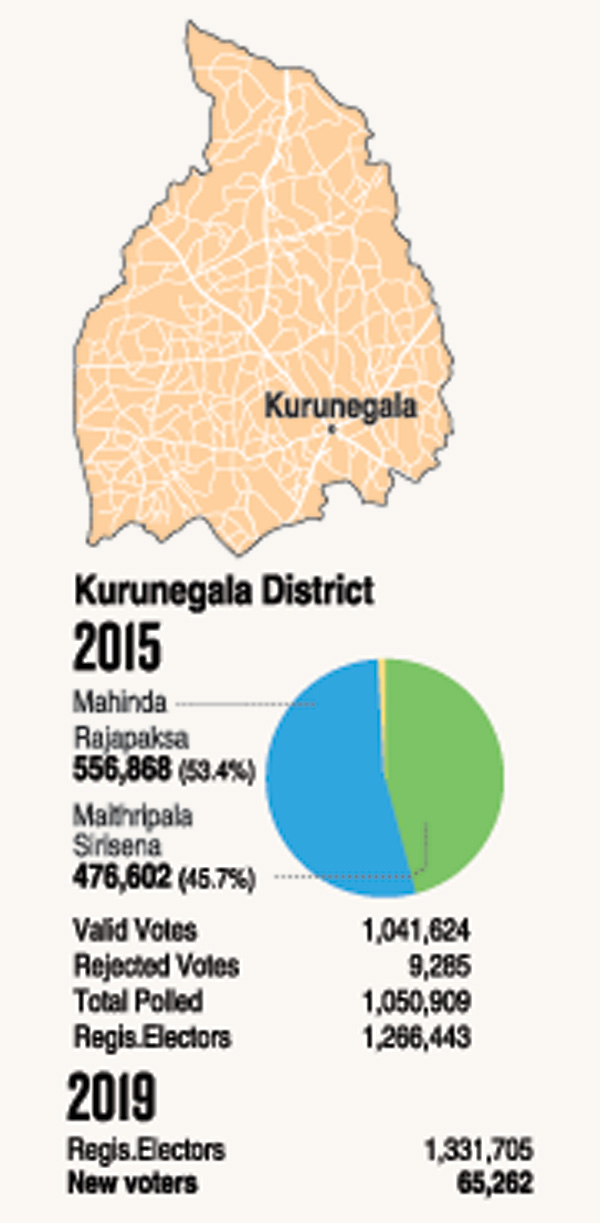
Various parties have resorted to new strategies to promote their candidate’s message. The UNP has already distributed leaflets in two stages while copies of NDF candidate Sajith Premadasa’s manifesto were due to be distributed to houses yesterday. The SLPP is also carrying out intensive house-to-house canvassing.
Drought, water shortages for agriculture, unemployment and the cost of living are among concerns of voters here.
Renuka Tissa, 54, who runs a business selling vehicle lubricants in Pothuhera, said national security is a major concern and he would vote for a candidate who can ensure the country’s security and a better future for his children.
He lamented that his business had suffered badly over the past year or so. “I had a turnover of Rs. 1 million a month during the first two years of this business but over the past year that has been cut by almost half,” Mr. Tissa said.
Three-wheeler drivers Pathum Kumarasinghe, 35, Sampath Ariyatilleke, 31, and Manjula Nissanka, 41, complained about the high cost of petrol.
“Even if petrol prices can’t be reduced, we would like if the next president can take steps to make this country more self-sufficient,” Mr. Kumarasinghe stressed.
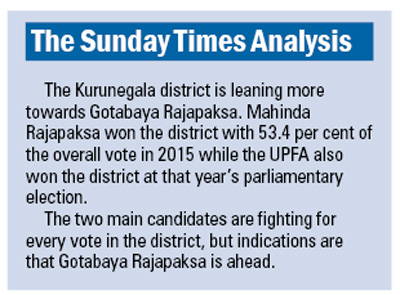
Return of mob violence a burning issue
It was Sunday, March 4, 2018, when a group of men suddenly showed up in Digana town and ordered all shops to close. “We did as they said and went home. When we came back the next day, my shop was reduced to ashes,” said Mohammed Lafir (36), standing inside his shop where he sells mobile phones and antiques. Mr Lafir says he suffered a total loss of Rs. 2.8 million due to the attack. He ran the shop with his brother, Mohammed Faiz (43). The government awarded the brothers compensation of Rs 100,000 each.
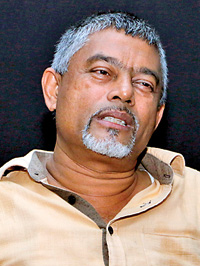
J.M. Niyas
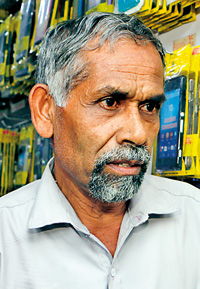
S.B. Ekanayake
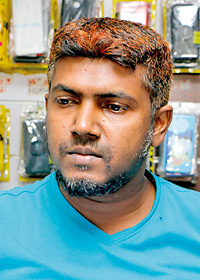
M. Lafir
Mr Lafir showed us video obtained on the day of the incident, showing a mob setting fire to his shop. A policeman is clearly seen standing by as the mob torched the establishment. “I spoke to some security forces personnel later, who told me that the mob looted the contents of the shop before setting fire to it,” he said.
People here allege that the mobs were led by Sri Lanka Podujana Peramuna (SLPP) Councilors. They however, note the government did little to stop them.
“I may vote for Anura Kumara Dissanayake at the election, as we can no longer trust either of the main parties. We have gone from the local Pradeshiya Sabha to Colombo, trying to sort out compensation. They want us to provide bills. What bills are they talking about? Everything was burned to ashes,” Mr Lafir said.
There are 85 shops along this section in Digana town. Shops owned by Muslims and non-Muslims were clustered together. Locals say there were people in the mob who specifically pointed out which shops were owned by Muslims.
There was one exception. S.B. Ekanayake’s (68) shop situated next to Mr Lafir’s too, was burned down. “I am the only Sinhalese victim of these attacks,” he told us. Mr Ekanayake said he suffered about Rs 200,000 in damages. After a hard fight, he was awarded Rs 40,000 as compensation.
Mr Ekanayake strongly feels the attacks had a political motive. “The mob first attacked Teldeniya. The distance from there to Digana is 7 miles. How was it that the security forces were not able to stop them while they were making their way here?”
Mobs also struck in Kengalla, some distance away. They burned the 200-year-old community mosque; Masjidul Laafir Jummah Masjid to the ground. The mosque is currently being rebuilt and a temporary one set up on adjoining land.
J.M. Niyas’s (59) grocery shop was situated on the other side of the road, in front of the mosque. The mobs burned it down too. Mr Niyas said most of those in the mobs were Sinhalese area residents.
“My wife is Sinhalese. There was no racism among us. It was those who grew up with us, who ate and drank with us that did this. That’s what hurts the most. That trust is completely gone now.”
Some who spoke to us, worried whether further anti-Muslim attacks would take place, either just before the election, or after it, irrespective of who wins the presidency.
Samsudeen Fazal (37) is an Islamic preacher. His youngest brother Abdul Basith (24) died of asphyxiation when mobs set fire to his parent’s house. His other brother also suffered severe burn injuries. “We lived together in harmony for so long. I even studied at a Sinhala school. This was a huge shock to us. We have a fear of further violence in the run-up to the election,” he noted.
Campaigning on a personal level at the grassroots
The Mawathagama electorate in the Kurunegala district has 98,000 registered electors. The electorate represents a microcosm of how the presidential election campaign is conducted at grassroots level by area organisers.
Sujith Chandrasiri, a United National Party (UNP) Pradeshiya Sabha (PS) member claimed that Mr Premadasa’s candidature has energised UNP supporters at the grassroots level. Supporters who wanted a change and who had kept away, are now expressing an interest in voting, as well as working towards Mr Premadasa’s victory,” he said.
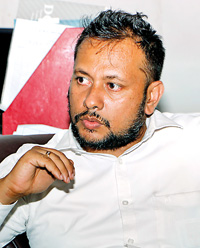
BMP Punyamini
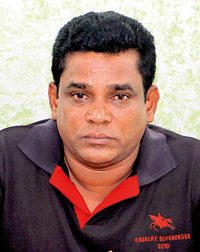
Sujith Chandrasiri
Explaining how the campaign is being conducted, Mr Chandrasiri said they were holding pocket meetings and conducting house-to-house campaigning. “We also receive a call from Sirikotha office every morning, requesting a 10-minute briefing on the progress of the campaign. The New Democratic Front (NDF) presidential candidate too, asks us to hand-deliver progress reports regarding the campaign,” he said.
The SLPP too is mounting a strong campaign. PS member B.M.P. Punyamini said they were campaigning along the lines of ensuring national security and providing economic development. Mr Punyamini, who is from the Pivithuru Hela Urumaya, said various parties allied with the SLPP are campaigning, both separately and together, to ensure Gotabaya Rajapaksa’s victory.
“We are going from house to house on canvassing and have also organised pocket meetings and larger village level meetings,” he added.
JVP member Chandana Dissanayake said they aim to capitalise on the discontent among a significant number of people in the area, who do not trust either of the two main candidates.
“The JVP had earlier relied on poster campaigns to get their message across. However, this is no longer possible, owing to strict election laws. As such, members are going house-to-house distributing leaflets, copies of candidate Anura Kumara Dissanayaka’s manifesto, as well as printed cards bearing the name and symbol of the candidate,” he noted.
KEGALLE DISTRICT :
Voters in Kegalle share similar concerns to those in Kandy. Most are concerned about the cost of living and are hoping for better opportunities under a new president. There are 674,440 eligible voters here.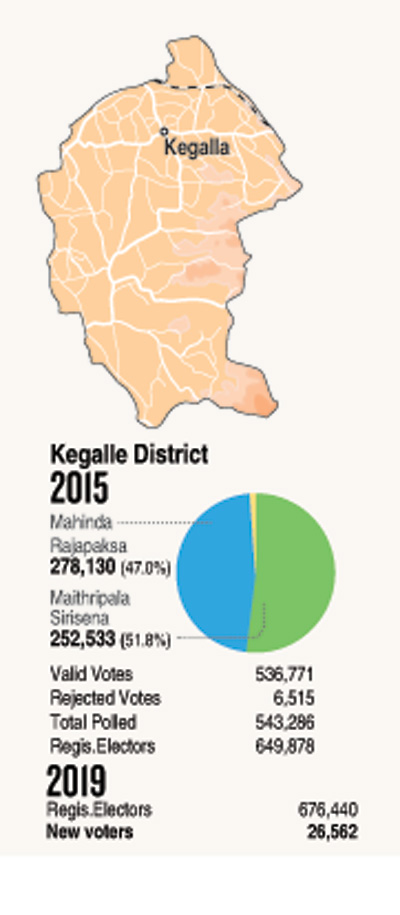
Wood carver W.J. Abeyratne, 63, said he would vote even though he is not interested in politics. He also said that the cost of living is high as food prices as well as day-to-day expenses have increased.
Mr Abeyratne’s wife, 55-year-old Kumari Tillekaratne, said the couple would prefer a candidate who is not from the two main parties to become president. ”Both main parties have made so many promises over the years but have broken them,” she remarked.
Priyangani Balasuriya, 35, a mother of three young children, stressed that people expect a change regardless of who becomes president. She said she finds it hard to manage home expenses as she has to spend more on tuition fees for children.
“We have a lot of hopes for our children. Whoever becomes leader must improve education, reduce the cost of living and fight corruption. Our children need a good environment to grow and develop the country,” she said.
Madushika Chaturanagi, 26, who is pregnant and a mother of a six-year-old daughter, said her husband was unemployed. He had applied for a government job but had not received a positive response.
“Regardless of whoever comes to power, change is needed,” she said. “Whoever comes to power should uplift the lives of people who are in need.”
In Galigamuwa, the Sri Lanka Freedom Party (SLFP) was opening a new campaign office for SLPP presidential candidate Gotabaya Rajapaksa.
In addition to SLFP area leaders, the ceremony was also attended by district SLPP leaders, MPs Kanaka Herath and Tharaka Balasooriya.
Speaking to The Sunday Times after the ceremony, Kegalle District SLFP leader and MP Ranjith Siyambalapitiya said the SLFP was conducting 500 pocket meetings throughout the district to support Gotabaya Rajapaksa.
“If you analyse the 2018 local government election in this district, the combined SLFP-SLPP vote tally was 325,000; the UNP got only 175,000: that is a difference of 150,000 votes. Most of those will go to Gotabaya Rajapaksa. There is no question that we will win,” Mr. Siyambalapitiya asserted.
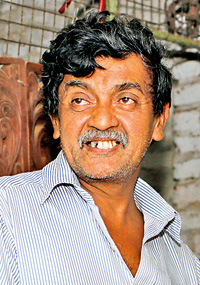
W.J. Abeyratne

Ranjith Siyambalapitiya
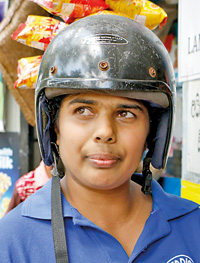
Priyangani Balasuriya
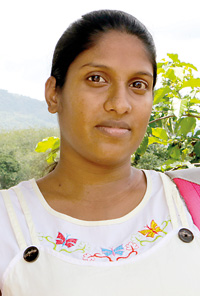
Madushika Chaturrangani
The SLFP’s decision to align with the SLPP has not met with universal approval within the party. In Mawanella, we met Farook A. Latiff, a Kegalle District SLFP organiser, who told us that he and three other SLFP district organisers, as well as seven local government councillors in the area, are backing Mr Premadasa.
He said they had decided to support Mr. Premadasa while remaining as SLFP members after the party went against the wishes of a majority of its members to field its own candidate in the presidential poll.
During the last local government election, the party fielded five Muslim candidates from Mawanella who were able to obtain a combined total of more than 6,000 votes for the SLFP while 37 Sinhala candidates who contested from the party obtained just over 2,300 votes between them, Mr. Latiff said.
“All five Muslim candidates who contested were elected. The Muslim votes came to the SLFP because I was the organiser. They will vote for Sajith this time because the people at the grassroots level are with us,” he claimed.
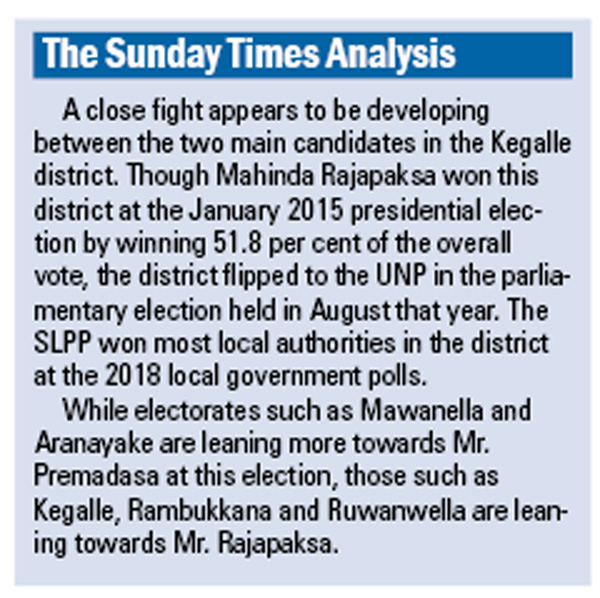
NUWARA ELIYA DISTRICT
A total of 569,028 registered electors in the Nuwara Eliya district are eligible to cast their votes. More than half of them (335,030) live in the Maskeliya electorate. Nearly 10,000 government officials will be deployed in the district for election duty. Polling will take place across 488 polling centres while ballots will be counted at 33 sites.
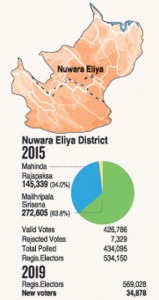
RATNAPURA DISTRICT
The Ratnapura district has 864,978 registered voters who will exercise their franchise at 627 polling centres. Ballots will be counted at 36 centres.
The Senior Deputy Inspector-General (DIG) of police in charge of the Sabaragamuwa province has ordered the DIGs of the Kegalle and Ratnapura districts to initiate a special police operation in the province on election day to ensure calm.
